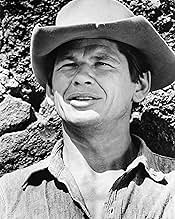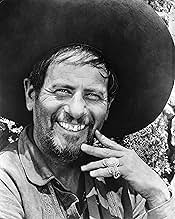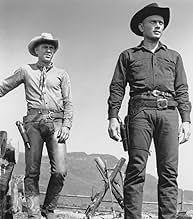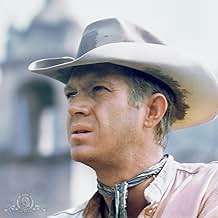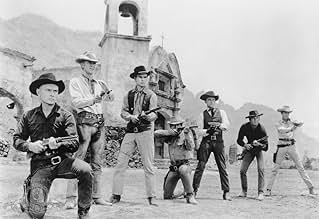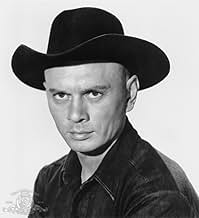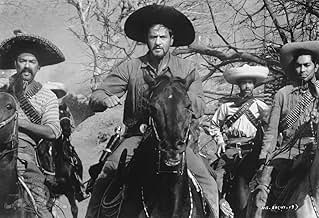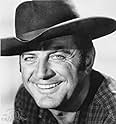Siete pistoleros son contratados por campesinos mexicanos para liberar a su pueblo de unos bandidos opresores.Siete pistoleros son contratados por campesinos mexicanos para liberar a su pueblo de unos bandidos opresores.Siete pistoleros son contratados por campesinos mexicanos para liberar a su pueblo de unos bandidos opresores.
- Dirección
- Guión
- Reparto principal
- Nominado para 1 premio Óscar
- 2 premios y 6 nominaciones en total
- Hilario
- (as Jorge Martinez de Hoyas)
- Villager
- (as Natividad Vacio)
- Miguel
- (as John Alonso)
Resumen
Reseñas destacadas
1. Chris: A leader, perhaps a former soldier, who has encountered danger before and gained a degree of mastery over his emotions in dangerous situation.
2. Vin: A capable man with a gun, perhaps a one time cowboy. He seems to be comfortable working as a loner but clearly would like to one day settle down.
3. Chico: The youngest of the Seven and most inexperienced. He wants to shed his farming past and attempts through acts of bravado to persuade others and himself that he is a gunfighter at heart.
4. Bernardo (Bronson): A strong solitary man that in many ways resembles Chris although not displaying the desire to lead. In many ways he is the most interesting character. He has made quite a bit of money in the past even though he is now broke. The attention he gives to the local village children and the gift he gives a village girl hint at the idea that while he is good at gunfighting he knows that it is a good family life that is important.
5. Lee (Vaughn): The most difficult character to relate to. He appears to be a gunman who in the past was cocky, arrogant and self assured but now after experiencing life on the run now doubts himself. He wants to do the right thing but finds it difficult to step up to the plate when it's his turn.
6. Britt (Coburn): A loner who is unequaled in a gun or knife fight. A man whose motives remain his own.
7. Harry (Dexter): A good man to have in a fight but one who lets greed cloud his every decision. It would seem that Harry is one of those individuals who is always one step away from gaining riches but somehow never gains them.
The leader of the bandits is Calvera (Walsh) who is not an unlikeable fellow. He appears to believe that it is his job to steal so that he can support himself and his men. For him it is only a job, not unlike the farmers who work the land to provide for their families. He has what can almost be describes as a code of ethics for those who make their living with guns. This code of ethics is evident in the way he treats the Magnificent Seven towards the end of the film. However, given the films ending, this code does not seem to be shared by the Magnificent Seven
Lastly, while many people may view this film as a western action film I think there is quite a bit of underlying humanity and character depth woven into the story. It is these underlying characteristics that distinguish it from the average western action flick and have helped to make this film as popular as it is.
The plot couldn't be simpler. Desperate Mexican villagers, bled white by local bandits, retain a group of almost equally desperate gunslingers from the other side of the Rio Grand to deal with the bandits. A lot of the fun arises early on as leader Cajun Chris seeks out half a dozen suitably deranged but deadly types for the job. Ostensibly they are doing it for the money but it becomes apparent early on that they are really on the team just for the hell of it. Once they are together things don't quite go to plan, but the camaraderie holds up, and their mission is accomplished, though at considerable cost.
Despite all the action it is a character-driven piece in some ways. Eli Wallach's Calvera the bandit leader is more than a cardboard cut-out villain and Yul Brynner's enigmatic Chris keeps us guessing. The villagers, despite their matching white smocks, are not all lily-white and each of the Seven has at least one interesting weakness.
A strong feature of the film is the music, penned by the ubiquitous Elmer Bernstein, and entirely appropriate, with a main theme which seems to be permanently welded into my brain.
'The Magnificent Seven' was made at a time when the appetite for westerns was going into decline. Whereas westerns were staple film and TV fare in the 50's, the sixties saw a sharp decline, as spy dramas and sex farces burgeoned. One interesting theory I've heard about this is that it's not so much that the audience tired of westerns, but that TV executives discovered that they were being watched by the people too poor to buy their sponsor's fine products. Anyway this film holds up very well after 45 years, a true classic and satisfying to watch.
Much is made here of the difference between fighting for money, fighting for justice, or fighting for a future. While this version of Kurosawa's epic contains all the philosophical leanings of the original, it isn't nearly as long-winded or languid. The downside to this is that it isn't nearly as moody or powerful. In fact, one can easily see the difference between American and foreign cinema simply by comparing Shichinin no samurai with The Magnificent Seven. One is incredibly dark and downbeat most of the time. The other mostly has a score that is so major it wouldn't sound out of place in Seven Brides For Seven Brothers.
Differences in feeling aside, the ultimate question is whether this version of the story manages to entertain. The hardest challenge any film faces is keeping the audience amused while all the exposition is laid out. Here, the exposition is kept to a minimum while carefully inserted between some fast-paced, albeit very mild action sequences.
Sometimes, the dialogue ("We deal in lead, friend.") gets incredibly stilted. Sometimes, it seems incredibly wise. Well, since we have examples of films where it's all stilted, all the time, we can forgive this one. The film also includes several textbook examples of how to include a sudden plot element without seeming contrived. When we learn why Calvera's men just won't go away, it needs no setup simply because it is consistent with their behaviour throughout the rest of the film.
In the end, The Magnificent Seven comes off as an excellent remake of a masterpiece. There are better Westerns out there, and there are better action films, but there aren't many. I gave it a nine out of ten. Go in expecting to be entertained, but little more, and you cannot go wrong.
There are so many moody looks between characters, and little movements or idiosyncrasies that just make each of the gunmen seem so real. Apparently, there were big egos behind the camera that caused these acts of showmanship, but unlike most films where the egos clash, here they just build the characters up without harming them.
Yul Brynner and Steve McQueen are just wonderful, and James Coburn and Charles Bronson both put in equal performances. There's just nothing about this film that you can fault, the script is kept light when required and the stunning score lifts up and the acting is huge but never too much. This is a must see again and again.
The focus of the screenplay is more on post-Bogart-pre-Eastwood cool banter than the gradual, taciturn character development of "Seven Samurai," but that doesn't mean that the film doesn't have a heart. Considering it clocks in at barely over two hours (compared to the marathonic three and a half of "Samurai"), it actually does a fantastic and very economical job of fleshing out its memorable cast of characters.
One particularly wonderful scene that stuck in my memory from the first time I saw the film ten years ago is the one where Lee (Robert Vaughn), drunk in the middle of the night, confesses his frailties and fear to two of the farmers. The scene (along with the general story of these down-and-out heroes) was groundbreaking in that it began the deconstruction and deromanticization of the Western hero which would be brought to fruition in Sergio Leone's unparalleled spaghetti Westerns.
The star-studded cast wouldn't hold up doing Shakespeare, but they're ideal in this gunslinging, cool-talking tough-guy adventure. As if a lineup of heroes that included Yul Brynner, Steve McQueen, Charles Bronson, and James Coburn wasn't enough, Eli Wallach steals the show as the Mexican bandit chief, a worthy precursor to his classic role "The Good, the Bad, and the Ugly." If the screenplay has a major flaw, it's that his character isn't featured more.
The score is, of course, one of the all-time classics. And while not as alive visually as the Japanese film that inspired it or the Italian Westerns it influenced, it's still mighty fine to look at, and the gunfights don't disappoint.
The pieces add up to one of the great entertaining films of all time, which still manages to be moving and morally aware despite its Hollywoodization of Kurosawa's vision.
¿Sabías que...?
- CuriosidadesAlthough the film received mixed reviews, Akira Kurosawa was so impressed he sent John Sturges a ceremonial sword as a gift.
- PifiasSteve McQueen wears Levi's jeans with the famous red tab, which were not introduced until the 1930s.
- Citas
[Calvera has just captured the Seven]
Calvera: What I don't understand is why a man like you took the job in the first place, hmm? Why, huh?
Chris: I wonder myself.
Calvera: No, come on, come on, tell me why.
Vin: It's like a fellow I once knew in El Paso. One day, he just took all his clothes off and jumped in a mess of cactus. I asked him that same question, "Why?"
Calvera: And?
Vin: He said, "It seemed to be a good idea at the time."
- Créditos adicionalesAnd Introducing Horst Buchholz
- Versiones alternativasThe German theatrical release differs from the German VHS video in the scene where the magnificent seven have been taken by surprise and have to put down their weapons on the table. Chico is the last one and stands in enragement. In the theatrical version he then nevertheless unstraps his belt like the others. In the VHS video version Chris jumps at Chico just in that moment when he wants to pull the gun. Chris takes his gun and puts it on desk. Then Chico unstraps his belt.
- ConexionesFeatured in Precious Images (1986)
- Banda sonoraThe Magnificent Seven Theme
Written by Elmer Bernstein
Selecciones populares
- How long is The Magnificent Seven?Con tecnología de Alexa
Detalles
- Fecha de lanzamiento
- País de origen
- Idiomas
- Títulos en diferentes países
- Els set magnífics
- Localizaciones del rodaje
- Cuernavaca, Morelos, México(desert, sets)
- Empresas productoras
- Ver más compañías en los créditos en IMDbPro
Taquilla
- Presupuesto
- 2.000.000 US$ (estimación)
- Recaudación en todo el mundo
- 416 US$
- Duración2 horas 8 minutos
- Color
- Mezcla de sonido
- Relación de aspecto
- 2.35 : 1


